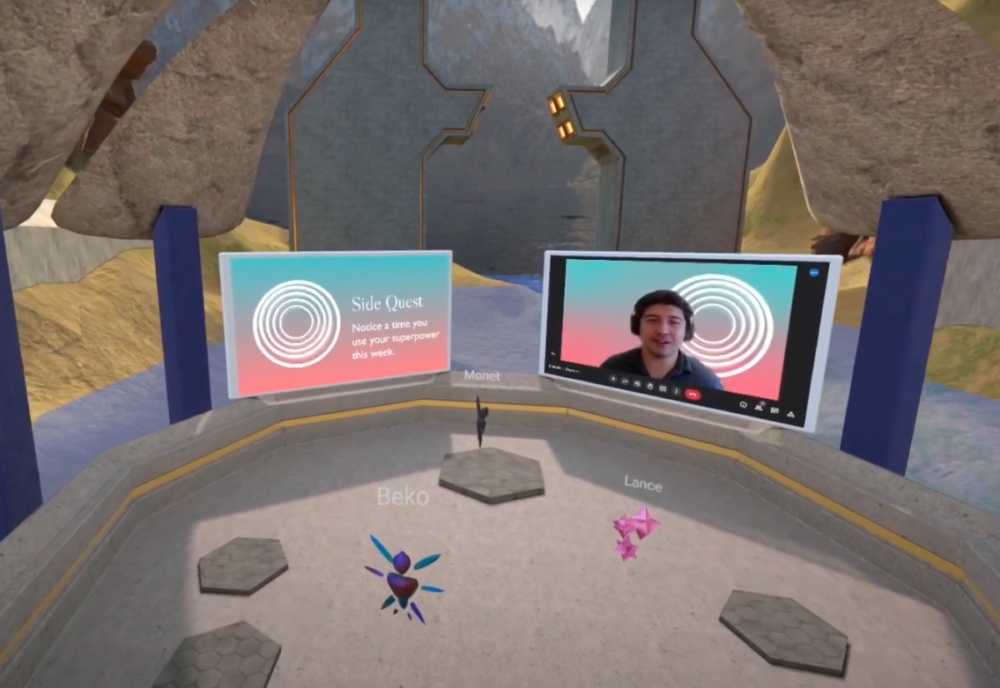Since the start of the COVID-19 pandemic, teletherapy has become a more common way for therapists to meet with their clients. A pair of Philly tech founders felt they could take the premise one step further.
Christian Ulstrup and Beko Jang met working for a venture-backed company in San Francisco that focused on medical device technology. The pair told Technical.ly they both thought that using a 3D environment could be useful for connecting people, and began work 18 months ago on a project for virtual spaces that could help people to open up in therapy. They brought in a third founder, Monet Goldman, a licensed family and marriage therapist, to round out the telehealth concept.
The trio are now cofounders of Virgils, a virtual reality landscape for therapists to meet with their clients. They launched a pilot program in October 2021, developing the platform using the WebXR standard and AWS for the backend.
“We just had a hunch that using virtual reality, using virtual spaces, could be a really powerful medium for healing and connection,” CEO Ulstrup said. The idea counters “a lot of the narrative around technology being atomizing and isolating, which it certainly has been in many cases.”
With a tagline of “back to reality through virtual reality,” Virgils also has its sights on serving some of the internet’s most active and impressionable users.
VR for youth connection
Through talking with parents and the therapists who used their platform, they realized there was also a gap in educating kids on how to healthily exist in the world of technology. Too much use can take a toll on mental health, for instance, and cause feelings of isolation or anxiety.
“We focus on youth because they have the most to gain,” CTO Jang said. “Being a teenager is already hard. Digital media makes it even harder. They need help navigating the digital frontier.”
In May 2022, they launched the six-week Virgils fellowship program, inviting teen and pre-teen boys into cohorts guided by a licensed therapist in the virtual space:
The cohorts meet once a week to cover topics on figuring out who you are, figuring out what you want for your future, and practicing skills like socialization, emotional intelligence and empathy. Therapists leading the fellowship program are also those participating in Virgils’ clinical pilot program.
The cofounders, who work out of Center City and Northern Liberties, are hoping to soon welcome girls of that age group, and mixed-gender groups as well.
“We think it’s very important that all the participants learn how to develop healthy relationships, how to avoid toxic interactions, how to be really supportive, and be fellows to one another in the digital age,” Ulstrup said.
Meeting teens where they are
Sessions take place in Virgils’ virtual reality platform where each participant is a polyhedron-type avatar. Ulstrup and Jang said they made the decision early on that all of the avatars in this world would look non-human.
“It’s like you’re going into a different place,” the CEO said. “And one of the things that’s afforded the users is one, it’s almost like you have a mask on, which makes things a little bit more comfortable.”
He said they received feedback that a lot of kids didn’t want to show their faces on camera, so they decided to have the kids meet as avatars until the last session, when they had the option to turn their cameras on.
“A big thing that we believe in, is meeting the kids where they already are,” Ulstrup said. “And so allowing them to feel very comfortable and take that first step in a virtual space that is engaging, where they don’t feel like they have to show their faces.”
Virgils does not provide clinical psychotherapy, so they do not work with health insurance. Instead, they bill parents directly for the fellowship sessions. Virgils is also working on setting up a 501(c)(3) nonprofit foundation to provide fellowship scholarships to qualified applicants.
What’s next for Virgils?
The main focus of the company currently is the Virgils fellowship, rather than the therapist platform, Jang said.
Virgils just finished its first cohort and is starting a second one. After kids finish the program, they can join an ongoing group called Virgils’ “inner ring” to keep learning and discussing what’s going on in the world and their lives. The founders are also discussing how they can get each group to meet in person.
Both founders said they want to build relationships with the families that participate in the fellowships and create longer-term programs for kids to help them continue to develop healthy habits. Ulstrup said eventually, he hopes to see this type of program as a supplement to existing education and healthcare institutions.
“We think that the healthiest relationship you can have with virtual media, with digital media, is one where you’re primarily rooted in reality,” Ulstrup said.







